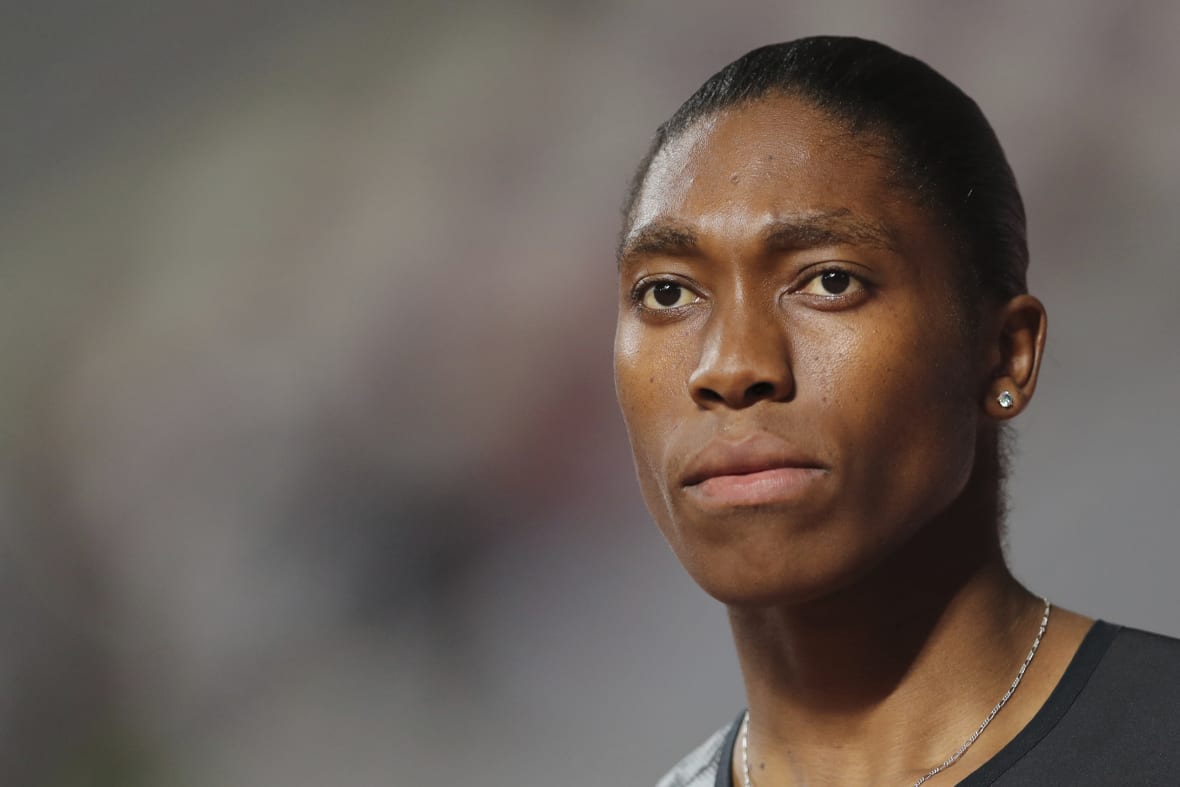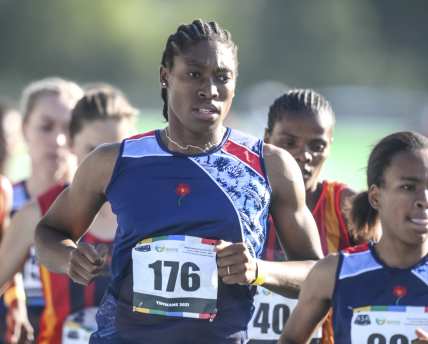Ruling in Caster Semenya’s human rights appeal against sex eligibility rules expected Tuesday
The core of her argument is that she has always been legally identified as female. Semenya says her testosterone should be considered a genetic gift similar to that of a swimmer's long arms.
The European Court of Human Rights is expected to deliver what could be the final word Tuesday in Olympic champion runner Caster Semenya’s yearslong legal challenge against rules that force her and other female athletes to lower their natural hormone levels through medical intervention to be allowed to compete in women’s track and field races.
The testosterone limits have effectively put a stop to Semenya’s career by barring her from running in her favored 800 meters event — where she is a two-time Olympic champion and three-time world champion — since 2019.
The South African athlete has refused to follow the rules and take medication to artificially lower her testosterone. She says the regulations enforced by the sport’s governing body, World Athletics, are discriminatory and violate her right to freely compete in women’s sports despite her being legally identified as female at birth and identifying as female her entire life.

Semenya has also pointed out what she says is the irony of being told to take artificial substances to be allowed to run, in a sport that has strict rules against doping.
Now 32 years old and sidelined from the sport, Semenya has already lost appeals at sport’s highest court in 2019 and at Switzerland’s supreme court in 2020, leading her to take her case to the European Court of Human Rights.
The judgment expected Tuesday from the European rights court is seen as likely to be her last legal avenue to overturning the rules.
Semenya’s case has been at the forefront of the highly contentious, complex and divisive issue of sex eligibility in sports for nearly 15 years since she emerged on the international track scene as a teenager in 2009. It has been connected to the fight over the inclusion of transgender women in female sports, but Semenya’s case is different to that issue even if there is some crossover.
What is Semenya’s case?
Semenya’s case at the European Court of Human Rights is against the government of Switzerland for not protecting her rights when its supreme court ruled against her over the rules three years ago.
Her lawyers argued in their submissions to the Strasbourg, France-based European court that her rights have been violated because she has been discriminated against and denied an “effective remedy” to that discrimination in her previous legal challenges.
Semenya’s highly complex case, which meshes ethical and scientific arguments into one highly-emotive issue over fairness in sports, would set a precedent for other athletes affected.
The core of her argument is that she has always been legally identified as female and should be allowed to compete in women’s sports, even if she has a testosterone level that is higher than the typical female range. Semenya says her testosterone should be considered a genetic gift in the same way as, for example, an athlete’s height or a swimmer’s long arms.
While World Athletics can’t challenge her legal gender, it says Semenya has a medical condition that makes her “biologically male” and her resulting high testosterone gives her an unfair advantage in the same way as a male competing in women’s sports. World Athletics says it needs rules to address that.
The “biologically male” assertion by World Athletics provoked an angry response from Semenya in what has been a bitter battle between the two for over a decade.
Is this the same issue as transgender women competing in sports?
No, although the issues are intertwined in some ways. Semenya is not transgender.
World Athletics accepts that Semenya was legally identified as female at birth but says she has one of several conditions that are known as differences in sex development, where she has the typical male XY chromosome pattern and a testosterone level that is up in the typical range for a male.

World Athletics and other sports cite high testosterone as the factor giving transgender women who have transitioned from male to female an unfair athletic advantage in women’s competitions, and the reason for track authorities announcing a ban on transgender women competing in female events in March.
World Athletics is enforcing its same argument over the unfair advantage provided by testosterone by compelling Semenya and others with similar conditions who were assigned female at birth to reduce their hormone level down to below a specified mark.
The rules have been tightened over the years and the testosterone levels deemed acceptable have been lowered. Also, while the rules initially only required Semenya and others to suppress their testosterone if they wanted to compete in races from 400 meters to the mile, they were expanded this year to include all female track events, meaning Semenya can’t compete in any top-level race now without reducing her testosterone.
World Athletics prescribes three methods for athletes to do that: taking birth control pills, using hormone-blocking injections or having surgery.
Are there other athletes affected?
Yes, most recently Namibian runner Christine Mboma, who won the silver medal in the 200 meters at the Tokyo Olympics in 2021 having been excluded from competing in the 400-meter race because of the same rules. Another 800-meter runner, Francine Niyonsaba of Burundi, has said she is also affected by the rules. She won silver behind Semenya in the 800 race at the 2016 Olympics.
World Athletics says there are “a number” of other elite female athletes who fall under the rules, although it won’t disclose their names to protect their medical confidentiality. All of them are now required to suppress their testosterone if they want to compete at top meets that include the Olympics and world championships.
What could this judgment mean?
If Semenya loses again, it’s likely the end of the road for her legal challenge. A victory for Semenya would still make it unclear how any rollback of the rules would play out.
The European rights court’s ruling would apply to Switzerland as a country and its supreme court ruling on the issue. But Semenya needs an appeal to succeed at the Swiss-based Court of Arbitration for Sport to then get the Monaco-based World Athletics organization to think about withdrawing the rules.
What might be significant is that when the Court of Arbitration for Sport rejected Semenya’s first appeal in 2019 on a narrow 2-1 ruling by judges, it accepted the rules were discriminatory but proportionate in a sports context to ensure fairness.
Semenya is effectively asking the European Court of Human Rights if it agrees that discrimination is sometimes allowed.
TheGrio is FREE on your TV via Apple TV, Amazon Fire, Roku and Android TV. Also, please download theGrio mobile apps today!


